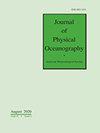Vertical Exchange Induced by Mixed-Layer Instabilities
IF 3
2区 地球科学
Q1 OCEANOGRAPHY
引用次数: 0
Abstract
Abstract Submesoscale turbulence in the upper ocean consists of fronts, filaments, and vortices that have horizontal scales of order 100 m to 10 km. High-resolution numerical simulations have suggested that submesoscale turbulence is associated with strong vertical motion that could substantially enhance the vertical exchange between the thermocline and mixed layer, which may have an impact on marine ecosystems and climate. Theoretical, numerical, and observational work indicates that submesoscale turbulence is energized primarily by baroclinic instability in the mixed layer, which is most vigorous in winter. This study demonstrates how such mixed-layer baroclinic instabilities induce vertical exchange by drawing filaments of thermocline water into the mixed layer. A scaling law is proposed for the dependence of the exchange on environmental parameters. Linear stability analysis and nonlinear simulations indicate that the exchange, quantified by how much thermocline water is entrained into the mixed layer, is proportional to the mixed-layer depth, is inversely proportional to the Richardson number of the thermocline, and increases with increasing Richardson number of the mixed layer. The results imply that the tracer exchange between the thermocline and mixed layer is more efficient when the mixed layer is thicker, when the mixed-layer stratification is stronger, when the lateral buoyancy gradient is stronger, and when the thermocline stratification is weaker. The scaling suggests vigorous exchange between the permanent thermocline and deep mixed layers in winter, especially in mode water formation regions.混合层不稳定性引起的垂直交换
上层海洋的亚中尺度湍流由锋面、细丝和涡组成,它们的水平尺度在100米到10公里之间。高分辨率数值模拟表明,亚中尺度湍流与强烈的垂直运动有关,可以大大增强温跃层和混合层之间的垂直交换,这可能对海洋生态系统和气候产生影响。理论、数值和观测工作表明,亚中尺度湍流主要是由混合层的斜压不稳定所激发的,这种不稳定在冬季最为强烈。这项研究证明了这种混合层斜压不稳定性是如何通过将温跃层水的细丝拉入混合层来诱导垂直交换的。提出了交换对环境参数依赖性的标度律。线性稳定性分析和非线性模拟表明,交换量与混合层深度成正比,与温跃层理查德森数成反比,并随着混合层理查德森数的增加而增加。结果表明:当混合层较厚、混合层分层较强、横向浮力梯度较强、温跃层分层较弱时,温跃层与混合层之间的示踪剂交换效率较高。尺度变化表明,冬季永久温跃层与深层混合层之间的交换较为激烈,特别是在模态水形成区。
本文章由计算机程序翻译,如有差异,请以英文原文为准。
求助全文
约1分钟内获得全文
求助全文
来源期刊
CiteScore
2.40
自引率
20.00%
发文量
200
审稿时长
4.5 months
期刊介绍:
The Journal of Physical Oceanography (JPO) (ISSN: 0022-3670; eISSN: 1520-0485) publishes research related to the physics of the ocean and to processes operating at its boundaries. Observational, theoretical, and modeling studies are all welcome, especially those that focus on elucidating specific physical processes. Papers that investigate interactions with other components of the Earth system (e.g., ocean–atmosphere, physical–biological, and physical–chemical interactions) as well as studies of other fluid systems (e.g., lakes and laboratory tanks) are also invited, as long as their focus is on understanding the ocean or its role in the Earth system.

 求助内容:
求助内容: 应助结果提醒方式:
应助结果提醒方式:


